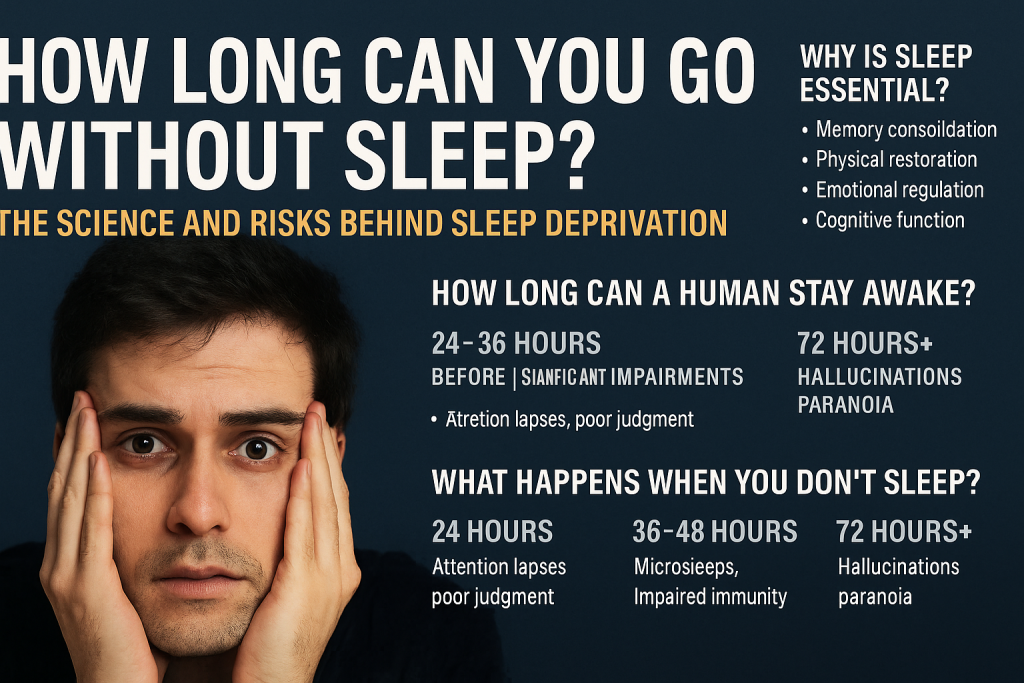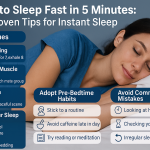How Long Can You Go Without Sleep? The Science and Risks Behind Sleep Deprivation
Sleep is a biological necessity, not a luxury. Yet, many people wonder: How long can you actually go without sleep? Whether driven by curiosity, work demands, or personal challenges, understanding the limits of wakefulness is crucial for your health and well-being. In this article, we’ll explore the science behind sleep deprivation, famous experiments, the effects of missing sleep, and why giving your body regular rest is vital.
Why Is Sleep Essential?
Sleep is far from a passive state. During slumber, your body and mind go through critical processes:
- Memory consolidation – Organizing and storing important memories.
- Physical restoration – Repairing tissues, muscles, and immune function.
- Emotional regulation – Balancing mood and stress hormones.
- Cognitive function – Optimizing learning, problem-solving, and creativity.
Lack of sleep can quickly undermine these processes, leading to noticeable—and sometimes dangerous—effects.
How Long Can a Human Stay Awake?
The Short Answer
Most experts agree that the average healthy adult can stay awake for approximately 24–36 hours before significant cognitive, emotional, and physical impairments set in. Beyond that, the body and brain begin to exhibit more severe symptoms and even short periods of “microsleep” where the brain briefly shuts off.
The World Record for Going Without Sleep
The most famous experiment on human sleep deprivation was conducted in 1964, when Randy Gardner, a 17-year-old high school student, stayed awake for 264 hours (11 days) as part of a science fair project. Under observation, he experienced profound cognitive and physical effects, including:
- Hallucinations
- Irritability
- Impaired memory and speech
- Paranoia
- Difficulty concentrating
After finally sleeping, Gardner appeared to recover without permanent damage, but experts strongly warn against attempting to break this record due to serious health risks.
Limits of Human Endurance
While some reports claim longer periods of wakefulness, the Guinness World Records has since discontinued tracking this record for ethical reasons. Most research suggests that going without sleep for more than 72 hours can trigger dangerous physical and mental consequences.
What Happens When You Don’t Sleep?
24 Hours Without Sleep
- Attention lapses and poor judgment
- Reduced hand-eye coordination (equivalent to being legally drunk)
- Mood swings and irritability
- Difficulty processing information
36–48 Hours Without Sleep
- Intense drowsiness
- Micro-sleeps (uncontrollable short periods of sleep)
- Impaired immune system
- Increased risk of accidents
72 Hours and Beyond
- Severe cognitive impairment
- Visual and auditory hallucinations
- Paranoia and anxiety
- Delusions
After such durations, the brain essentially forces itself to sleep, even if you attempt to stay awake, through microsleeps and sudden sleep attacks.
The Science Behind Sleep Deprivation
Why does a lack of sleep have such dramatic effects? Here’s what experts have learned:
- Neurotransmitter imbalance: Sleep deprivation disrupts the balance of chemicals in your brain, impairing communication between neurons.
- Build-up of toxins: During sleep, the brain removes waste products. Without rest, toxins accumulate, affecting cognitive function.
- Hormonal changes: Growth hormone drops, and stress hormones rise, contributing to mood and health problems.
Can You Die From Lack of Sleep?
While it’s extremely rare, chronic total sleep deprivation can be fatal. Studies in animals have shown that going without sleep for long periods (beyond two weeks) can be deadly. In humans, a rare genetic disorder called Fatal Familial Insomnia eventually leads to death due to the inability to sleep.
Health Risks of Sleep Deprivation
- Increased risk of heart disease and stroke
- Weakened immune function
- Obesity and metabolic disorders
- Depression and anxiety
- Higher risk of accidents and injuries
Why Does the Body Force Sleep?
Unlike food or water, sleep is not optional. The body has a homeostatic sleep drive that builds up the longer you’re awake. Eventually, your brain overrides your conscious willpower, causing involuntary sleep episodes even if you want to stay awake. This biological mechanism protects your health and survival.
Are There Any Safe Ways to Stay Awake?
While caffeine, light exposure, and brief bursts of activity can temporarily stave off drowsiness, they are not substitutes for actual sleep. No supplement or trick can replace the restorative processes that happen during genuine sleep cycles.
How Much Sleep Do You Really Need?
Adults typically require 7–9 hours of sleep per night for optimal functioning. Teens, children, and infants need even more to support growth and development. Regularly skimping on sleep, even by an hour or two, can have cumulative negative effects.
Conclusion: Prioritize Your Rest
So, how long can you go without sleep? While a human can survive without sleep for a few days, the risks and side effects escalate quickly. Sleep is vital for every aspect of your health—physical, emotional, and mental. Instead of pushing your limits, focus on developing healthy sleep habits to ensure you stay at your best.
Tips for Better Sleep
- Maintain a regular bedtime and wake time.
- Limit caffeine, particularly in the afternoon and evening.
- Create a dark, quiet, and cool sleep environment.
- Avoid screens before bed.
- Practice relaxation techniques like deep breathing or meditation.
Remember, your body and brain need sleep to thrive. Prioritizing rest is an investment in your long-term health and happiness.


